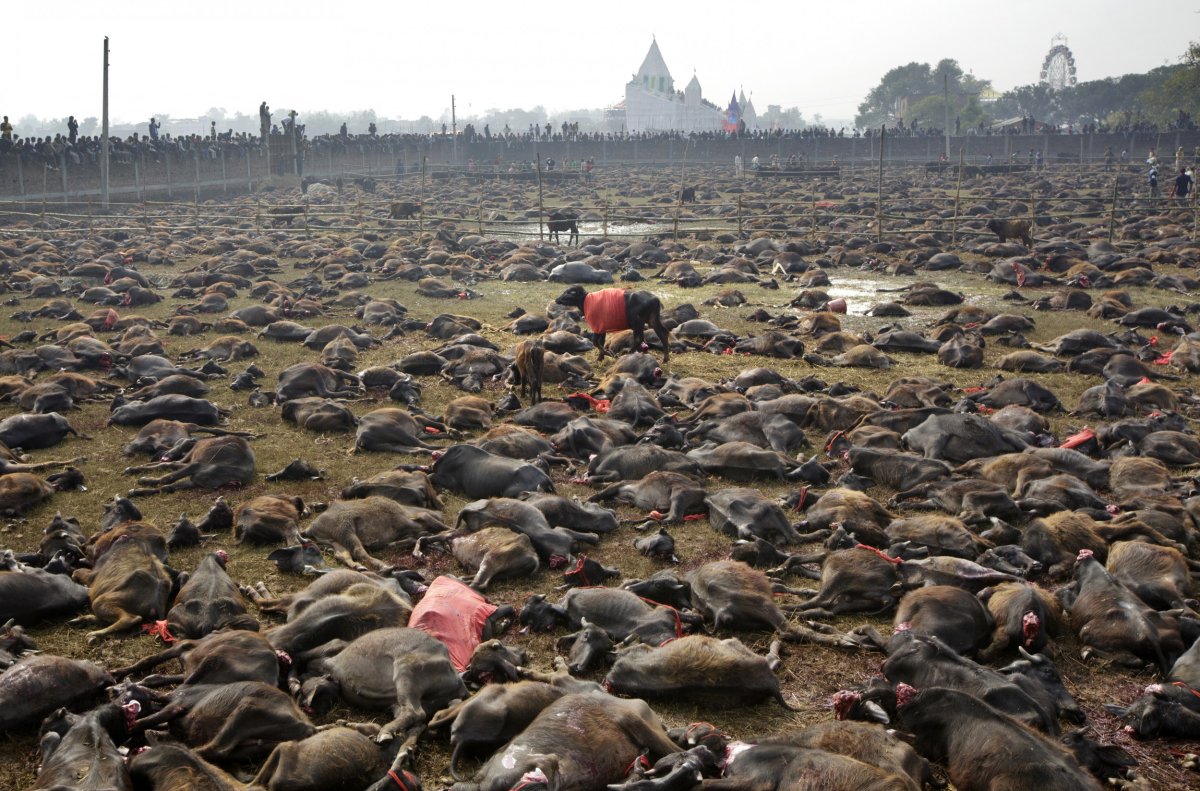At the beginning of next month, Nepal will host an event which features the largest mass animal sacrifice in the world.
The Gadhimai festival—which takes place every five years in the country's Bara district—involves a whole month of celebrations, culminating in the ritual slaughter of tens of thousands of animals.
A host of creatures—ranging from buffalos, goats and chickens, to pigs, ducks, rats and pigeons—are decapitated with blunt metal swords during an alcohol-fueled bloodbath, according to non-profit Humane Society International (HSI.)
"The killing is brutal, there can be do doubt about that," Wendy Higgins, an HSI spokesperson, told Newsweek. "The animals are decapitated using a large sword-like instrument. The animals are killed in front of each other which will add to their distress, and this includes mothers killed in front of their babies. Our HSI team has witnessed the killing first hand and reported that death for the buffalo at least is often not instant and requires several blows."
The festival can trace its origins back to around 265 years ago when the founder of the Gadhimai Temple, Bhagwan Chowdhary, dreamt that the goddess Gadhimai wanted blood in return for freeing him from prison, protecting him from evil and bringing him prosperity.
While the goddess wanted a human sacrifice, the priest brought animals instead—and this practice has been repeated every five years since in a bid to please her.
"Devotees believe that if they don't offer a sacrifice, they will not be able to avert future calamity and their prosperity will be affected," Higgins said.
When the killing peaked in 2009, it estimated that around 500,000 animals were ritually slaughtered at the festival. However, this figure fell dramatically to about 30,000 in 2014, largely as a result of campaigning by international and local animal rights groups.
In 2015, the Gadhimai Temple Trust announced that it was banning animal sacrifice at future festivals, following efforts by Animal Welfare Network Nepal and Humane Society International, India.

However, it is now not clear whether the Trust will guarantee the ban when this year's festival takes place on December 3 and 4. Furthermore, the ban only applied to the killing of buffalo within the temple arena itself.
"When the Temple Trust pledged an animal sacrifice ban at future festivals, it was met with jubilation, but more recently [it] has fallen silent on the issue and so it would appear that the ban cannot be guaranteed," Higgins said. "Even if the ban is upheld, the Temple Trust only has authority over the killing that takes places in the main temple arena. That is where many thousands of buffaloes are beheaded, so that wold make a huge impact. The temple has no authority over the killing of animals outside of the arena."
"Regardless of the temple's position though, just recently the Supreme Court of Nepal and several government ministries all issued statements against the killing, so there is considerable momentum," Higgins said. "The problem is implementation on the ground because once animals reach the festival site, with so many thousands if not millions of devotees, it's almost impossible at that point to stop the killing."
This is why campaigners are now working with officials at the India-Nepal border who will be confiscating any animals passing into the country to be sacrificed.
According to Humane Society International, an estimated 70 percent of the animals slaughtered at the festival have been imported across the Indian border. In 2014, the Indian Supreme Court passed a law in a bid to stop this illegal movement of animals, however, the rules are still openly flouted.
"As compassionate citizens it is our duty to speak up for the hundreds of thousands of innocent animals who are condemned to an utterly unjustified beheading at Gadhimai," Alokparna Sengupta, managing director of HSI, India, said in a statement. "We are battling centuries of belief, so we know this won't be an easy battle to win. But we will do everything we can to stop this unnecessary bloodshed."
Animal rights campaigners are also trying to raise awareness among attendees, encouraging people to bring flowers and sweets to offer the goddess, instead of animals to sacrifice. However, they say that overturning centuries of tradition will be an extremely difficult task.
"The Gadhimai festival is an unholy bloodbath that is not part of Hinduism and has no place whatsoever in any religion," Tanuja Basnet, director of Humane Society International, Nepal, said in a statement.
"Here in Nepal, animal welfare groups, temple priests and religious groups are opposing the killing and promoting compassion to animals instead, urging all faiths to support alternative offerings at festivals instead of blood sacrifice. Together we must strive to make a kinder world for all animals in Nepal," Basnet said.
Uncommon Knowledge
Newsweek is committed to challenging conventional wisdom and finding connections in the search for common ground.
Newsweek is committed to challenging conventional wisdom and finding connections in the search for common ground.
About the writer
Aristos is a Newsweek science reporter with the London, U.K., bureau. He reports on science and health topics, including; animal, ... Read more
To read how Newsweek uses AI as a newsroom tool, Click here.








